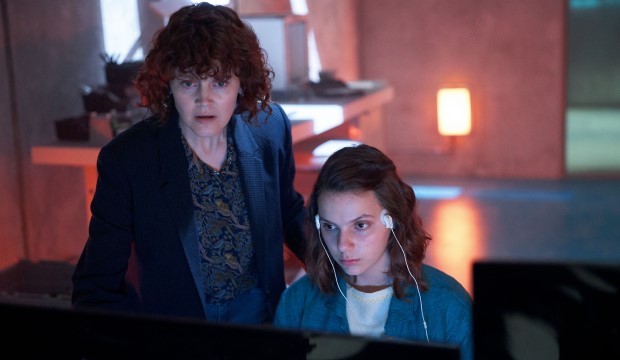
People frequently question the purpose of fantasy, despising its irrelevance to the real world. (Because what’s so real about theocratic regimes, loud-mouth populism, and dark matter particles?) But although this critic would elevate escapism to being important for its own sake, His Dark Materials strives for more. The physical and metaphysical concepts layer its fantasy with fascinating substance, of which other franchises can only dream.
These elements merge together in a wondrous bond as Lyra (Dafne Keen), wanting to solve the enigma of Dust, enters Will’s Oxford in episode two. Inside a third universe, the sense of adventure only grows.

Lyra (Dafne Keen) explores Will's alternate Oxford. Photo: BBC
When Lyra runs through this different version of her home, there's magic in the mundane. Not that Oxford is mundane, of course, but it’s an
easy city to fill with cliches. Since Will’s world is basically our own –
complete with smartphones, traffic lights, and female scientists – creating a
new spark from ancient surroundings is a difficult task.
But the presence of an impossible girl from a different universe, endlessly curious and never sedentary, changes these earthly banalities into delights. She finds Dr Mary Malone (Simone Kirby), a particle physicist who’s testing the theory that certain ‘shadow particles’ have consciousness – her experimental machine bearing similar properties to Lyra’s alethiometer.

Lyra finds particle physicist Dr Mary Malone (Simone Kirby). Photo: BBC
There are some deflating moments with
functional dialogue, used to robotically explain the stakes and situation. Given
that the series is meant for kids the motivation is comprehensible,
but some of the performances suffer as a result. When Lyra explains her upsetting
background to Dr Malone, the explanatory mechanisms clang with the emotion and character of the scene.
Yet Keen is still absorbing as the lead: excelling when Lyra reverts to childish immaturity, which conflicts with Will’s introverted and slightly older sensibilities.

Mrs Coulter (Ruth Wilson) appears like a fashionable Lady Macbeth. Photo: BBC
Meanwhile,
Lyra’s world continues to feel the dark ripple-effect of Asriel’s portal. These particular implications in the religious politics aren’t in the book, but they provide a
wider context for the Magisterium. Its authoritarian stranglehold begins to tighten
after Cardinal Sturrock (Ian Peck) suddenly, tragically, mysteriously dies – earning
Father MacPhail (Will Keen) the potential to replace him.
But more than showing the inner workings of the Magisterium, writer Jack Thorne also gives Mrs Coulter (Ruth Wilson) more to do. In the series, she’s like a fashionable Lady Macbeth: speaking poison to the ear of MacPhail, bending him to her will.
The witches are blamed for Sturrock’s death, motivating the Magisterium to act. And all while the election for the new Cardinal is taking place. It’s an intricate system, its authority hanging in the balance, filled with big voices and violent actions – culminating in a fiery finale.
More effort and money have clearly been dedicated to legitimising these fabricated worlds; even the daemons are more varied and numerous than before. Considering the realities that bookend this broadcast, episode two catches your breath and thrills you at the same time.
His Dark Materials continues Sundays at 8pm on BBC One
| What | His Dark Materials series 2 episode 2, BBC review |
| When |
15 Nov 20 – 15 Nov 21, ON BBC ONE |
| Price | £n/a |
| Website | Click here for more information |




